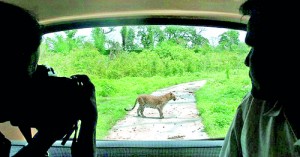Sunday Times 2
India: Why leopard attacks have become an election issue
It is banter as usual in a small tea shop in Lauki Kala village bordering Nepal in India’s Uttar Pradesh state.
Six village elders are discussing the upcoming general elections over tea. Children play outside in the sugarcane fields.
But 43-year-old Shyam Prakash is unusually silent: his life changed since his four-year-old daughter Leela was killed in a leopard attack outside his shop about four months ago.

Constant fear: In Lauki Kala, a village bordering Nepal in India's Uttar Pradesh state, at least six children have died in leopard attacks (AFP)
“Forget elections or candidates, we are living in constant fear because of regular leopard attacks. My child’s body was found two days after she went missing in the nearby jungle. The leopard killed her and now I don’t allow my other three children to step out of the house,” Mr Prakash said.
At least 75,000 people living in more than 100 villages along the local Suheldev wildlife sanctuary have been living in constant fear of being attacked by leopards.
This 300 sqm (777 sqkm) forest, spread across the India-Nepal border region, is home to at least 70 leopards, according to forest official SS Srivastava.
“At least six children have died in leopard attacks and more than four people have been seriously injured in the past six months,” he says.
“We caught one of the leopards which killed two children in three days and sent him to a nearby zoo. But the attacks continue since these villages are on the forest periphery without any basic infrastructure.”
There is considerable anger among the villagers in the region over government’s inaction and most of them have decided to boycott the upcoming general election.
Bhairavi Devi’s five-year old grandson survived a leopard attack after neighbours raised an alarm. She says most of the villages plunge into darkness after sunset due to a lack of electricity.
“At least 50 villages here are without electricity. That’s why leopards regularly attack our children. Politicians have been coming here ever since elections were announced with promises to bring power supply and roads. But we said get these first and only then will we vote for anyone,” she says.
Leopard attacks have become a major election issue in the region which falls under the Shravasti-Balrampur parliamentary constituency. More than 1.5 million voters are eligible to vote here.
Most of the candidates, including the current member of parliament from India’s ruling Congress party to the former twice elected MP of the regional Bahujan Samaj Party Rizwan Zaheer, say they understand the plight of the affected villagers.
“Leopard attack is one of the biggest election issues here. With a lack of roads, electricity and adequate forest vigil, such attacks may only grow further. We all have promised action if elected,” says Mr Zaheer.
The region saw a spate of wolf attacks between 2001 and 2003 in which at least 100 children were killed and several others injured, officials said.
People living in the city of Balrampur, barely an hour’s drive from the sanctuary, sympathise with the villagers.
“The constituency is covered with jungles and we are lucky to be living in the town, where such attacks are a rarity,” says Misri Lal, a fruit vendor.
“But when successive governments have failed to improve conditions here in the town, God alone knows when will the thousands of villages be considered.”
(Courtesy BBC


